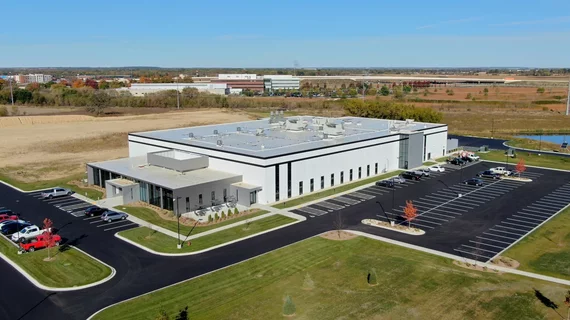NorthStar opens facility to assist with development and distribution of vital radioisotopes
NorthStar Medical Radioisotopes just celebrated the launch of its Dose Manufacturing Center in Beloit, Wisconsin.
The 52,000 square foot state-of-the-art facility will provide much needed developmental and manufacturing support for pharmaceutical companies that produce and distribute radiopharmaceuticals. The hope is that the facility can boost domestic production of much needed radioisotopes like Ac-225, Lu-177, Cu-64, Cu-67, In-111 and others.
The facility’s ribbon-cutting comes amid growing demand for nuclear medicine procedures. At the same time, the availability of the radioisotopes required to conduct nuc med exams fluctuates based on foreign suppliers, creating accessibility gaps in the U.S.
Frank Scholz, president and CEO of NorthStar Medical Radioisotopes, hopes that the company’s new facility will help address some of these issues.
“Our mission is to provide patients with global access to game-changing radiopharmaceuticals. And in doing so, helping to reimagine cancer therapy by producing radioisotopes for the treatment of cancer and other serious diseases,” Scholz said in a release, later adding that NorthStar’s expertise in the radiopharmaceutical will help guide biopharmaceutical companies as they carry out research and development of new therapeutics.
“The unique characteristics and requirements, along with the specialized facilities, processes, equipment, technology and talent know-how that it takes to develop and manufacture radiopharmaceuticals means in most cases, the biopharmaceutical companies designing these agents don’t have the specialized skills or processes necessary to deliver these medicines, particularly when they are still in clinical trials,” Scholz continued. “These companies understand that it is not realistic or financially viable to do it themselves. That is where NorthStar rises above the rest.”
Previously, NorthStar produced molybdenum-99 (Mo-99) at its facilities in Beloit. Mo-99 and its decay product, Tc-99m, are the most frequently utilized radioisotopes in the world. NorthStar’s prior production of Mo-99 was in an effort to address the reliance of the U.S. on foreign suppliers. However, in the fall of 2023, NorthStar halted its production, citing rising costs.
Last week, Nuclear Medicine Europe warned organizations of an impending shortage of Mo-99 due to the high-flux reactor in Petten, Netherlands, having to undergo vital repairs. NMEU has not yet provided an estimated restart date for the HFR, and supply chain hiccups were expected to begin almost immediately.

